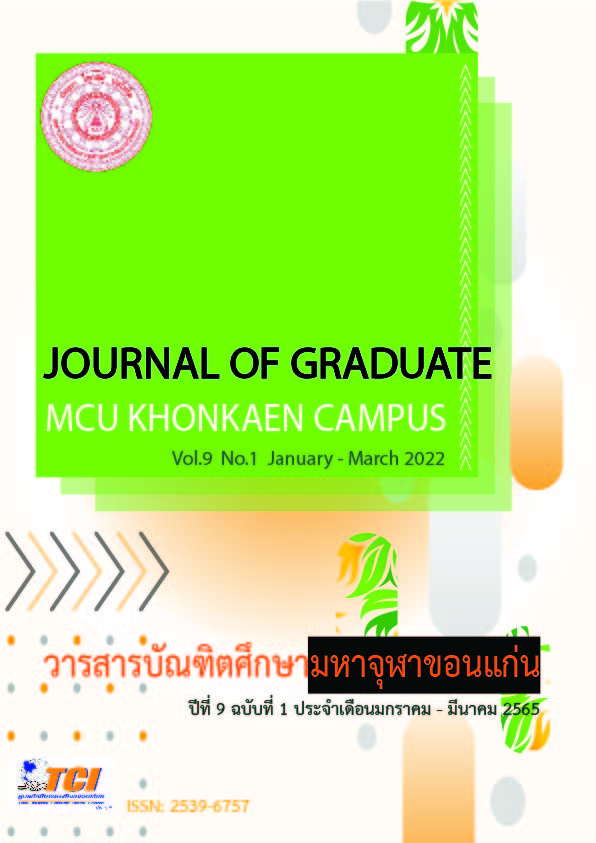ปัจจัยทางสังคมที่ส่งผลต่อการกล่อมเกลาทางการเมืองในสังคมไทย ปัจจัยทางสังคมที่ส่งผลต่อการกล่อมเกลาทางการเมืองในสังคมไทย
Main Article Content
บทคัดย่อ
บทความนี้มีวัตถุประสงค์เพื่อ 1) ศึกษาแนวคิดทฤษฎีเกี่ยวกับการกล่อมเกลาทางการเมือง
2) ศึกษาปัจจัยทางสังคมที่ส่งผลต่อการกล่อมเกลาทางการเมืองในสังคมไทย ผู้ศึกษาใช้วิธีการทำการ
ศึกษาจากเอกสารแล้วทำการวิเคราะห์ข้อมูลเชิงพรรณนา เพื่อนำไปเป็นองค์ความรู้ในการศึกษาปัจจัย
ทางสังคมที่ส่งผลต่อการกล่อมเกลาทางการเมืองในสังคมไทย
ผลการศึกษาพบว่า การกลอมเกลาทางการเมือง หมายถึง การถ่ายทอดพฤติกรรมของบุคคล
ซึ่งกระทำต่อกันจากคนรุ่นหนึ่งไปยังอีกรุ่นหนึ่ง เพื่อให้เกิดการเรียนรู้และการปฏิบัติอย่างต่อเนื่อง
ซึ่งบุคคลจะเรียนรู้ ทั้งในสิ่งที่เกี่ยวข้องกับการเมืองและไม่เกี่ยวข้องกับการเมืองโดยตรง แต่สิ่งต่าง ๆ เหล่านั้น
ก็มีผลต่อทัศนคติและพฤติกรรมทางการเมืองของบุคคลด้วย และปัจจัยทางสังคมที่ส่งผลต่อการกล่อมเกลา
ทางการเมืองในสังคมไทย ประกอบด้วย (1) ครอบครัว (2) กลุ่มเพื่อน (3) สถาบันการศึกษา
(4) สื่อมวลชน (5) ศาสนา (6) กลุ่มอาชีพ และ (7) สถาบันทางการเมือง
Article Details

อนุญาตภายใต้เงื่อนไข Creative Commons Attribution-NonCommercial-NoDerivatives 4.0 International License.
เอกสารอ้างอิง
โกวิทย์ คุณรัตน์. (2541). การกล่อมเกลาทางการเมืองของนักเรียนมัธยมศึกษาตอนปลายในสังคมเมืองและสังคมชนบท : กรณีศึกษาเปรียบเทียบโรงเรียนมงฟอร์ตวิทยาลัย อำเภอเมือง จังหวัดเชียงใหม่และโรงเรียนแม่สายประสิทธ์ศาสตร์ อำเภอแม่สาย จังหวัดเชียงราย. วิทยานิพนธ์ รัฐศาสตรมหาบัณฑิต. บัณฑิตวิทยาลัย มหาวิทยาลัยเชียงใหม่.
จุมพล หนิมพานิช. (2531). กระบวนการเรียนรู้ทางการเมืองกับทัศนคติทางการเมืองของคนไทย. ในเอกสารการสอนชุดวิชาพื้นฐานทางสังคมและวัฒนธรรมของเมืองไทย หน่วยที่ 1-8. นนทบุรี: มหาวิทยาลัยสุโขทัยธรรมาธิราช.
พรศักดิ์ ผ่องแผ้ว และ สายทิพย์ สุคติพันธ์. (2525). การเมืองของเด็ก. กรุงเทพมหานคร: เจ้าพระยาการพิมพ์.
พรศักดิ์ ผ่องแผ้ว. (2526). ข่าวสารทางการเมืองของคนไทย. กรุงเทพมหานคร: เจ้าพระยาการพิมพ์.
พรศักดิ์ ผ่องแผ้ว. (2531). รัฐศาสตร์เฉิงประจักษ์. กรุงเทพมหานคร: ภาควิชาการปกครอง คณะรัฐศาสตร์จุฬาลงกรณ์มหาวิทยาลัย.
พฤทธิสาณ ชุมพล. ม.ร.ว. (2547). ระบบการเมือง : ความรู้เบื้องต้น. (พิมพ์ครั้งที่ 7). กรุงเทพฯ: สุขภาพใจ.
วรรณธรรม กาญจนสุวรรณ. (2544). วัฒนธรรมทางการเมือง การเมืองการปกครองไทยตามรัฐธรรมนูญฉบับประชาชน. (พิมพ์ครั้งที่ 2). กรุงเทพฯ: วี.เจ.พริ้นติ้ง.
วิวัฒน์ เอี่ยมไพรวัน. (2562). วัฒนธรรมทางการเมือง. ในเอกสารการสอนชุดวิชาหลักพื้นฐานทางรัฐศาสตร์ หน่วยที่ 9-15. นนทบุรี: มหาวิทยาลัยสุโขทัยธรรมาธิราช.
วัชรินทร์ ชาญศิลป์. (2 562). ปัจจัยที่มีผลต่อการอบรมกล่อมเกลาทางการเมืองของเยาวชนไทย. วารสารรัฐศาสตร์ปริทรรศน์ มหาวิทยาลัยเกษตรศาสตร์, 6(1), 1-26.
สัญญา สัญญาวิวัฒน์. (2532). สังคมวิทยาการ. (พิมพ์ครั้งที่ 2). กรุงเทพฯ: เจ้าพระยาการพิมพ์.
สำนักงานเลขาธิการสภาผู้แทนราษฎร. (2556). วัฒนธรรมทางการเมือง. กรุงเทพฯ: สำนักการพิมพ์สำนักงานเลขาธิการสภาผู้แทนราษฎร.
Easton. D. (1965). A Framework for Political Analysis. Englewood Cliffs. (New Jersey: Prentic-Hall Inc).
Easton, D and Dennis. J. (1986). Children in the Political System. (New York : McGraw-Hill).
Gabriel A. Almond and G. Bingham Powell. (1966). Comparative Politics: A Developmental Approach. (Boston: Little Brown).
Greenstein. F. (1968). Political Socialization. International Encyclopedia of The Social Sciences. New York: Macmillan and Free Press.
Pie.Lucien. (1962). Politics Personality and Nation Building: Burma’s Search for Identity. New Harven: Yale University Press.
Rush. M and Philip. A. (1871). An Introduction to Political Sociology. London: Thomas Nelson and sons.

